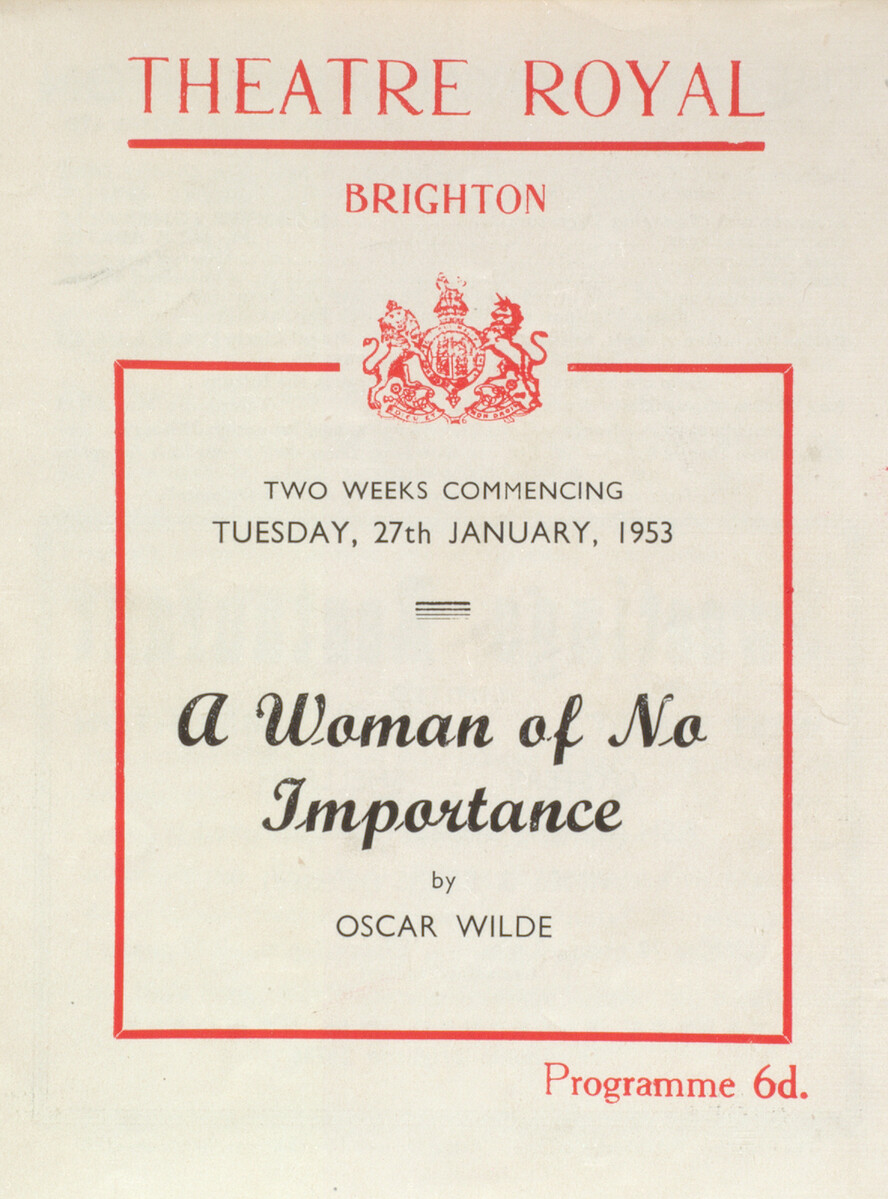Happy Birthday, Oscar Wilde!
16 October 2024 marks the 170th anniversary of Oscar Wilde’s birthday.
Oscar Wilde was a Victorian poet and playwright who reached the height of his career in the 1880s and early 1890s. He was an exceedingly renowned personality who attracted a large following of admirers. Plays by Oscar Wilde are still performed today; the most well-known being ‘The lmportance of Being Earnest‘.
However, he is as famous for his downfall as he is for his creative work. ln 1895 he was imprisoned after an infamous and very public trial for what was called ‘gross indecency’ (homosexuality, which was then illegal). At the time Wilde was married to his wife Constance. The marriage was happy at first and he had two sons, Cyril and Vyvyan. After prison Oscar was a disgraced man, never again accepted in society. He lived exiled in France where rules were less rigid than Victorian Britain, and died destitute in Paris aged 46.
Wilde visited Brighton on a number of occasions. In 1884 he gave lectures in the Royal Pavilion as part of a national tour. During the 1890s, he returned for social visits, staying at the Hotel Metropole and Grand Hotel, as well as other places.

A Wilde Life
Early days
Oscar Wilde was born in Dublin to intellectual parents. He studied at Dublin then Oxford University and was an outstanding scholar. He graduated with a rare double first (in Classics). While at Oxford Wilde became involved with the Aesthetic Movement (or Decadents), which focused on looking for the beauty in everyday life, taking its style cues from the ancient Greeks and Romans. He also became a fan of famous social and art historian John Ruskin, attending some of his lectures on the importance of art in everyday life.
After university Wilde established himself as a poet and playwright. He lived in Chelsea, the Bohemian part of London, mixing with the artistic, creative set. He was known for his great wit, his flamboyant personality, his fashion sense and the clever and amusing comments he made about people and society.
Marriage
Oscar married Constance Lloyd in 1884. Constance had money of her own and the couple lived well. They enjoyed spending lavishly, particularly on decorating their house in Chelsea. However, Oscar always needed to work. For a short while he became editor of Women’s World, a magazine. He also wrote plays, essays and his only novel ‘The Picture of Dorian Gray‘. He was a popular speaker and travelled the country – and to America, lecturing to delighted audiences. Oscar delivered two talks at the Royal Pavilion in 1884 on ‘Dress‘ and ‘The Value of Art on Modern Life’.
Lord Alfred Douglas
Since his days at Oxford Oscar had been interested in the different types of relationship a person could have with the same sex, both romantic and sexual. He initially had an affair with family-friend Robbie Ross, but as his fame and reputation grew he was introduced to Lord Alfred Douglas. Meeting ‘Bosie’ (as he was known to his friends) became a pivotal moment for Oscar.
Alfred Douglas was handsome, rich and spoilt a known socialite who liked to attend the underground clubs which had been set up for men who liked to have sex with men. He and Oscar formed an intense romantic and sexual relationship and were often seen about fashionable parts of London together.
Aside from Bosie Oscar formed romantic, sexual and idealistic relationships with young working-class men whom he met through the network of underground gay clubs that had sprung up since the full criminalization of homosexual acts in 1885.
Wilde was not secretive about his relationships and often careless in a way that would lead him open to blackmail, especially during a time when homosexual acts were criminalized and Victorian morale values were particularly at their peak.
Imprisonment
ln 1895, egged on by Bosie who hated his father, Wilde took the Marquess of Queensbury to court for criminal libel. This was after Queensbury left a calling card at Oscar Wilde’s gentleman’s club which read ‘For Oscar Wilde, posing as a sodomite.’
He was essentially accusing Oscar of being gay. . The case gripped society and the trial filled newspapers. All manner of personal details came out and Wilde’s entire life, personality and creative works were cruelly cross-examined.
Queensbury was acquitted but the trial left Oscar bankrupt and he was instantly arrested for ’Gross indecency’. He had the opportunity to escape to France but he stayed and faced his trial. He was sentenced to two years hard labour, which for a man of Oscar’s class was almost unheard of. Oscar’s prison experiences almost certainly contributed to his early death. His health and spirit were broken.
Very few people stood by Oscar due to the nature of his ‘crimes’. He and his wife separated, and he never saw his family again, although Constance helped support him financially. A few close friends remained loyal, and they helped him to go and live in exile in France when he was released from prison in 1897. Oscar Wilde died in Paris in November 1900, the cause of death meningitis. He had lived in poverty and in poor health for a number of years before this.
Oscar’s legacy
Oscar’s spectacular rise and fall – and his entertaining plays and sayings – have kept Oscar in the public eye ever since. He has been the subject of numerous books, plays and films. Interest in Oscar Wilde’s life and works is international and he is more famous today than he was in his lifetime.

Over the years, various events and talks have celebrated Oscar Wilde and his visits to the Royal Pavilion.
In 2011, ‘Oscar’ and his Aesthetic Ladies (played by Greg Marshall, Penny Balchin and Sarah Tobias) promenaded around the rooms prior to a lecture on Wilde by Sarah Tobias.
In November, we’ll take a look at Wilde’s lectures and discover what he had to say in Brighton’s own ‘House Beautiful’!